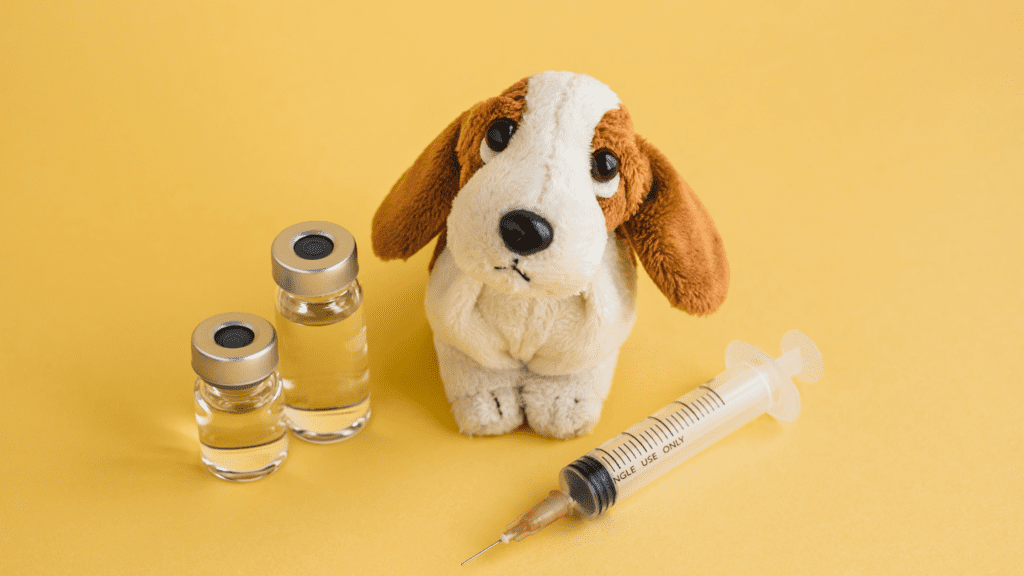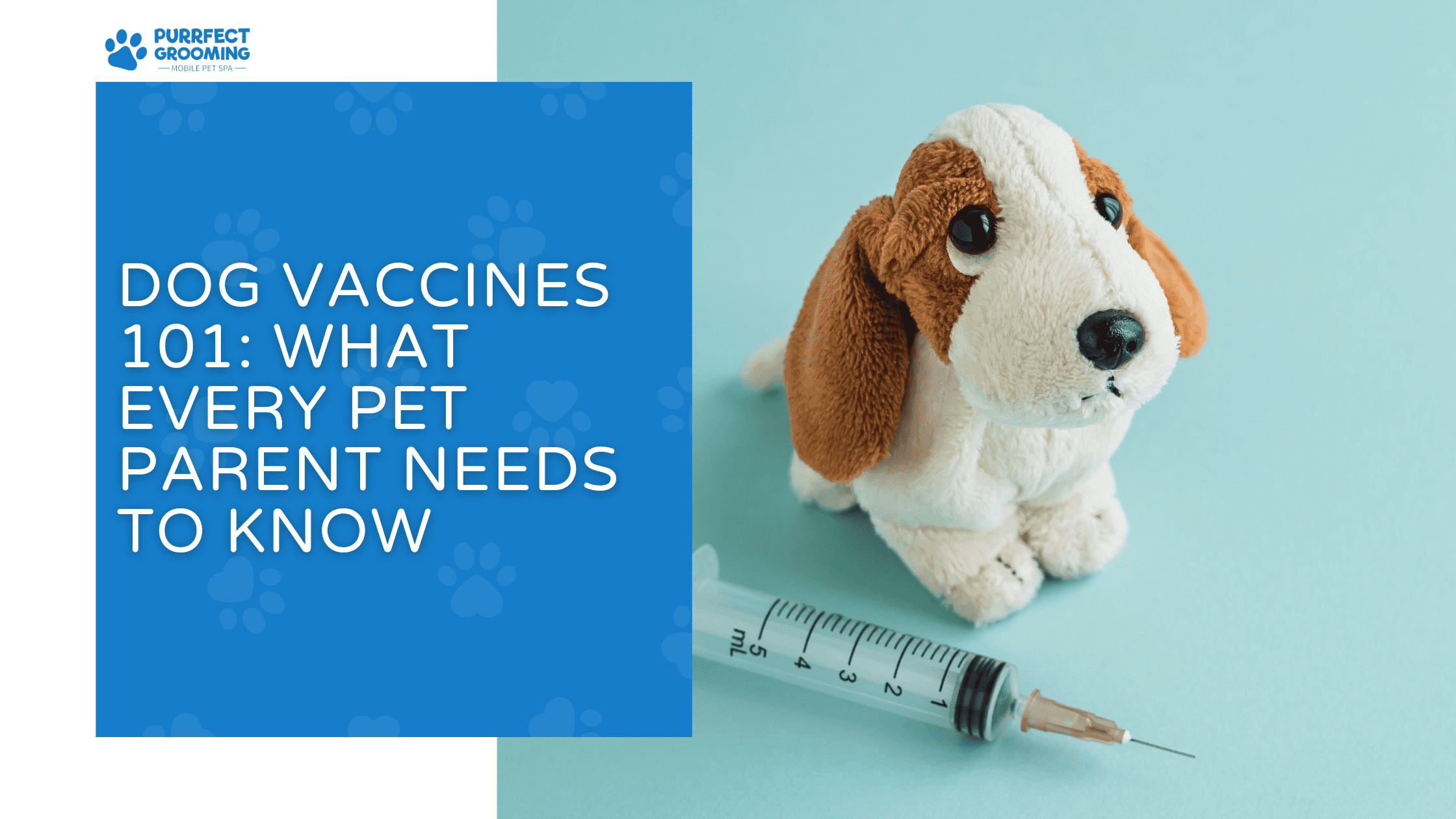Dog Vaccines 101: What Every Pet Parent Needs to Know
Keeping your dog healthy starts with proper dog vaccinations. Just like humans, dogs are susceptible to numerous life-threatening diseases, many of which can be prevented with routine vaccines. Vaccines for dogs not only protect your pet but also contribute to public health by reducing the spread of infectious diseases.
According to the World Health Organization (WHO), rabies vaccinations prevent nearly 59,000 human deaths every year. This staggering statistic highlights the importance of dog vaccines, which play a vital role in keeping both animals and humans safe.
But what vaccines do dogs need? What is the correct puppy shot schedule? And how often should adult dogs get booster shots? This guide will cover everything you need to know about vaccinations for dogs, ensuring your furry friend stays healthy for years to come.

Why Are Dog Vaccinations Important?
Vaccinations work by stimulating your dog’s immune system to recognize and fight off harmful viruses and bacteria. Without vaccines for dogs, many diseases can lead to severe illness, permanent damage, or even death.
Key Benefits of Dog Vaccinations
| Benefit | Explanation |
| Disease Prevention | Protects against deadly illnesses like rabies, distemper, and parvovirus. |
| Herd Immunity | Reduces the spread of infectious diseases within the community. |
| Cost-Effective | Prevents expensive veterinary treatments for preventable diseases. |
| Legal Compliance | Some vaccinations, such as rabies, are required by law. |
Vaccines are not just for individual protection; they also help safeguard the pet community. If a significant percentage of the dog population is vaccinated, the spread of diseases is greatly reduced, benefiting both pets and their owners.
What Vaccines Do Dogs Need?
Not all vaccines are necessary for every dog. They are divided into two categories: core vaccines (essential for all dogs) and non-core vaccines (recommended based on lifestyle, location, and risk exposure).
Core Vaccines for Dogs
Core vaccines are considered essential because they protect against highly contagious and deadly diseases.
| Vaccine | Disease Prevented | Frequency |
| Rabies | Fatal viral infection affecting the brain | Every 1-3 years |
| Distemper | Affects respiratory, nervous, and digestive systems | Every 3 years |
| Parvovirus | Severe gastrointestinal disease | Every 3 years |
| Adenovirus (Hepatitis) | Causes liver damage and respiratory infections | Every 3 years |
Non-Core Vaccines for Dogs
Non-core vaccines are optional but highly recommended for dogs based on their lifestyle, environment, and exposure risks.
| Vaccine | Recommended For | Frequency |
| Bordetella | Dogs frequently in kennels, daycare, or dog parks | Every 6-12 months |
| Lyme Disease | Dogs living in tick-infested areas | Annually |
| Canine Influenza | Dogs exposed to large groups of other dogs | Annually |
| Leptospirosis | Dogs exposed to wildlife or contaminated water | Annually |
Your veterinarian can help you determine whether non-core vaccines are necessary based on your dog’s specific lifestyle and risks.
Puppy Shot Schedule: When and What to Expect
Puppies receive some immunity from their mother’s milk, but this protection fades after a few weeks. A proper puppy shot schedule is essential to build immunity and protect them from common diseases.
First-Year Puppy Vaccination Schedule
| Age | Vaccine |
| 6-8 weeks | Distemper, Parvovirus |
| 10-12 weeks | DHPP (Distemper, Hepatitis, Parvovirus, Parainfluenza) |
| 12-16 weeks | Rabies, DHPP booster |
| 16-20 weeks | Leptospirosis, Bordetella (if needed) |
Adult Dog Vaccine Schedule
| Vaccine | Frequency |
| Rabies | Every 1-3 years |
| DHPP | Every 3 years |
| Bordetella | Every 6-12 months |
| Leptospirosis | Annually |
Consistently following the dog vaccine schedule ensures your pet remains protected throughout their life.
Common Side Effects and How to Handle Them
While most dogs tolerate vaccines well, minor side effects are possible.
Mild Side Effects (Usually resolve within 24-48 hours)
✅ Mild fever
✅ Temporary lethargy
✅ Swelling at the injection site
Severe Side Effects (Rare but require immediate vet attention)
❌ Vomiting
❌ Facial swelling
❌ Difficulty breathing
If you notice severe reactions after a vaccination, contact your veterinarian immediately.
Cost of Dog Vaccines and Ways to Save
Dog vaccinations are an investment in your pet’s health, but the cost can add up. Here’s a general price breakdown:
| Vaccine | Average Cost |
| Rabies | $15-$30 |
| DHPP | $20-$50 |
| Bordetella | $10-$30 |
| Leptospirosis | $20-$40 |
How to Save on Dog Vaccines
💡 Look for free or low-cost vaccine clinics run by animal shelters.
💡 Enroll in pet wellness plans that cover vaccines.
💡 Check with local vet schools offering discounted services.
Myths and Misconceptions About Dog Vaccinations
There are several myths surrounding vaccinations for dogs, and it’s important to separate fact from fiction.
❌ Myth: “Vaccines can cause autism in dogs.”
✅ Truth: There is no scientific evidence linking vaccines to autism in dogs.
❌ Myth: “Indoor dogs don’t need vaccinations.”
✅ Truth: Even indoor dogs can be exposed to diseases through humans, other pets, or trips outside.
Final Thoughts
Following a proper dog vaccine schedule and keeping up with vaccinations for dogs is one of the most effective ways to keep your pet healthy. Whether it’s a puppy shot schedule or booster shots for adult dogs, vaccinations are a critical part of responsible pet ownership.
🔥 Pro Tip: Keep a digital copy of your dog’s vaccination records. Many boarding facilities, groomers, and dog parks require proof of vaccinations!
FAQs
1. Can my dog go outside without vaccinations?
No, unvaccinated dogs are at high risk of contracting deadly diseases from the environment and other animals.
2. How often should dogs get rabies shots?
Rabies vaccines are required by law and should be administered every 1-3 years, depending on your location.
3. Are dog vaccines safe?
Yes! While minor side effects are possible, the benefits of vaccinations far outweigh the risks.
4. What happens if my dog misses a vaccination?
If your dog misses a vaccine, consult your vet for a catch-up schedule.
5. Can vaccines make my dog sick?
Most side effects are mild and temporary, such as fatigue or mild swelling. Serious reactions are rare.
